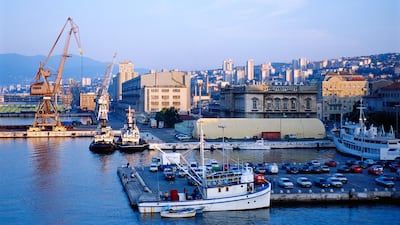Ukraine is eyeing Croatia’s ports as a way of exporting grain, but ferrying its produce to the Adriatic is a less than ideal alternative to the blockaded Black Sea.
Even Croatia's biggest deepwater port is small compared to Ukraine's big-hitting docks and the 1,500km between them make it a costly workaround, The National has been told.
Croatia is offering to help after Russia’s withdrawal from a UN-brokered grain deal effectively shut Ukraine’s Black Sea ports and left it scrambling for replacement routes.
The pressure to get food to the world market is huge because Ukraine is one of the world’s top suppliers of wheat, corn and sunflower oil and countries such as Lebanon and Somalia rely on its produce.
Long ways round via Poland, Hungary and Romania have taken some of the slack but have run into various practical problems and cannot handle the same volume of grain as the Black Sea ports.
Adding another piece to the jigsaw, Ukraine and Croatia on Monday “agreed on the possibility of using Croatian ports” and will “work on laying the most efficient routes”, Ukrainian Foreign Minister Dmytro Kuleba said.
Croatian Foreign Minister Gordan Grlic-Radman said on a visit to Kyiv that the Adriatic ports would be made available for Ukrainian grain “in the context of a global food crisis”.
Croatia can offer its main Adriatic port of Rijeka, which has a dedicated grain terminal and boasts it can unload 400 tonnes of dry goods per hour. The port of Zadar typically handles soya beans.
The Croatian route could involve river barges being loaded with grain in Ukraine and sailing up the Danube via Romania and Serbia.
Once they reach Croatia, the bend of the Danube means the grain would be unloaded from the barge and complete the final leg to the coast by rail or lorry.
In Rijeka, the grain would be loaded on to cargo ships and set sail for the world market, a shorter route than via Poland and the Baltic.
EU documents say ships embarking from Rijeka get to the Suez Canal seven days quicker than from Hamburg in northern Germany. The river barge method has already been used to export Ukrainian grain from the Romanian port of Constanta.
Small volume
However, Rijeka’s pier in Croatia can only handle smaller cargo ships compared to Constanta and Ukrainian ports such as Odes, said grain and shipping analyst Bilal Muftuoglu.
Rijeka’s limit of 60,000 deadweight tonnes excludes the Panamax-class ships that would typically carry grain to China, one of the main beneficiaries of the Black Sea deal, he said.
“You wouldn’t be able to ship to farther-away destinations and it would be more expensive because you might have to use more vessels,” Mr Muftuoglu said.
“The biggest problem is just that Croatia’s ports don’t handle much in volume. They’re significantly smaller than Constanta or Burgas in Bulgaria.
“Rijeka last year handled around six million tonnes of dry volumes. That’s less than what Ukraine can export in just one month. So it’s tiny.”

Another risk is that Croatia's economy is undercut if Ukrainian grain enters the local market, something which farmers in Eastern Europe have complained of.
The five EU countries bordering Ukraine – Bulgaria, Hungary, Poland, Slovakia and Romania – banned duty-free imports of Ukrainian cereals in April to protect their farmers.
Poland said the move was not an attack on Ukraine and said the volume of grain transiting through its territory had actually increased as exporters use its rail links to transport food.
But the Polish route brings delays because Ukraine’s Soviet-era railways have wider tracks than its EU neighbours, meaning trains at the border need their wheels changed or grain to be loaded into new wagons.
Brussels has proposed that Ukraine builds new rail lines compatible with the EU standard, linking it with the ports of Rijeka, Trieste and Koper on the Adriatic as well as northern hubs such as Hamburg, Rotterdam and Gdansk.
But this would take years and the UN has warned that food prices started rising within days of Moscow quitting the Black Sea deal. Russia said the side of the bargain allowing it to export its own food and fertiliser was not upheld.
The US ambassador to the UN, Linda Thomas-Greenfield, said discussions were “going on behind the scenes” to persuade Russia to return to the deal.
“We know that that is the most efficient way, the most effective way, to get the most grain to the market and to the mouths of people in need,” she said.


